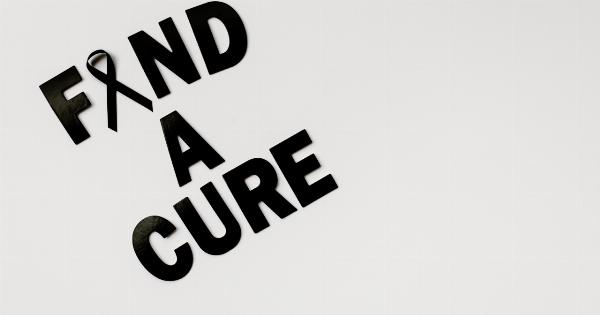Male breast cancer is a rare form of cancer that develops in the breast tissue of men. It occurs when abnormal cells in the breast begin to grow uncontrollably and form a tumor.
Male breast cancer accounts for less than 1% of all breast cancer cases, and it is often diagnosed in men between the ages of 60 and 70.
Causes of Male Breast Cancer
The exact cause of male breast cancer is unknown, but certain factors can increase a man’s risk of developing the disease. These factors include:.
- Age – The risk of male breast cancer increases as men get older.
- Family history – Men with a family history of breast cancer are at a higher risk of developing the disease.
- Exposure to estrogen – Men who have been treated with high doses of estrogen, such as those used to treat prostate cancer, are at an increased risk of developing male breast cancer.
- Klinefelter syndrome – Men with Klinefelter syndrome, a genetic condition that affects hormone production, are at an increased risk of developing male breast cancer.
Symptoms of Male Breast Cancer
The symptoms of male breast cancer are similar to those of breast cancer in women, and they can include:.
- A lump or swelling in the breast or under the arm
- Nipple discharge
- Nipple retraction (turning inward)
- Redness or scaling of the nipple or breast skin
If you experience any of these symptoms, it is important to see a doctor right away. Keep in mind that these symptoms can also be caused by other conditions, such as a benign breast tumor or an infection.
Diagnosis of Male Breast Cancer
If your doctor suspects that you have male breast cancer, he or she will order tests to confirm the diagnosis. These tests may include:.
- Mammogram – A mammogram is an X-ray of the breast. It is used to look for abnormalities in the breast tissue.
- Ultrasound – An ultrasound uses sound waves to create images of the breast tissue. It is used to identify solid masses and fluid-filled cysts.
- Biopsy – A biopsy involves removing a sample of breast tissue and examining it under a microscope. It is used to determine whether the tissue is cancerous.
Treatment of Male Breast Cancer
The treatment for male breast cancer depends on the type of cancer, the stage of the cancer, and the man’s overall health. Treatment options may include:.
- Surgery – Surgery is often the first treatment for male breast cancer. The surgeon may remove the entire breast (mastectomy) or just the cancerous tissue (lumpectomy).
- Radiation therapy – Radiation therapy uses high-energy X-rays to kill cancer cells. It is often used after surgery to destroy any remaining cancer cells.
- Chemotherapy – Chemotherapy uses drugs to kill cancer cells. It is usually given after surgery and radiation therapy to prevent the cancer from returning.
- Hormone therapy – Hormone therapy uses drugs to block the production of estrogen or other hormones that may be fueling the cancer.
Prevention of Male Breast Cancer
There is no sure way to prevent male breast cancer, but there are some things you can do to reduce your risk:.
- Maintain a healthy weight – Being overweight or obese can increase your risk of male breast cancer.
- Limit alcohol consumption – Drinking too much alcohol can increase your risk of male breast cancer.
- Exercise regularly – Regular exercise can help reduce your risk of male breast cancer.
- Get regular checkups – Regular checkups can help detect male breast cancer early, when it is most treatable.
Conclusion
Male breast cancer is a rare but serious disease that requires prompt medical attention. If you experience any symptoms of male breast cancer, see a doctor right away.
With early detection and treatment, many men with male breast cancer can go on to live long, healthy lives.


























